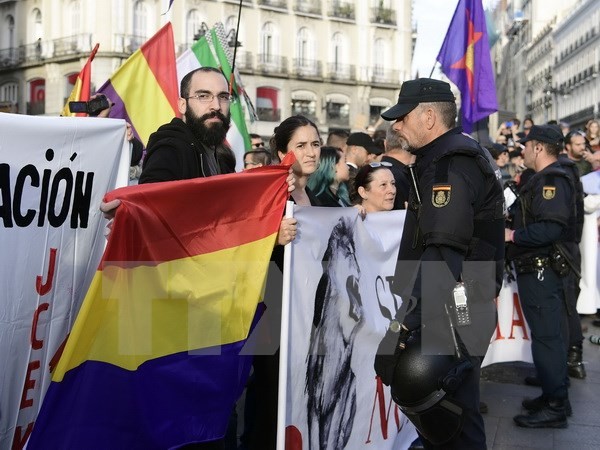What’s the future of Catalonia after separation claim?
Anh Huyen -
(VOVWORLD) - The Spanish government has given Catalonia a final ultimatum, jailed Catalonia’s leader, and mobilized force to prevent secession, escalating the tensions between the central government and Catalonia.
 Demonstrators call for referendum on Catalonia's independence on October 1st (Photo: AFP/TTXVN) Demonstrators call for referendum on Catalonia's independence on October 1st (Photo: AFP/TTXVN)
|
Negotiations are taking place but so far are going nowhere. The Catalonian administration has declared independence but is waiting to see what comes of the negotiations. The central government is demanding a clearer indication of what Catalonia intends to do.
Ultimatum rejects autonomy
Madrid has given a deadline of Thursday for an official response from Catalonia. If the Catalan government chooses a hard line, Madrid will trigger Article 155 which allows the Spanish government to impose direct rule on Catalonia and call an election in the region.
The crisis began when Catalonia held a referendum on October 1st on independence from Spain. Based on the referendum’s results, Catalan leaders on October 10th signed a declaration on independence from Spain but delayed any further action. The central government has repeatedly asked Catalonia’s leaders to give a clear answer as to their secession plans. Instead of giving a clear answer, Catalonia’s leaders called for two months for dialogue and asked Madrid to stop its suppression under which the Spanish Supreme Court on October 16 jailed two Catalan leaders for provoking violence. The court’s decision has resulted in an increase of protests and demonstrations in Catalonia over the past few days.
Roots of the conflict
The conflict between the Spanish central government and Catalonia began 3 centuries ago in 1714 when Spanish King Philip V occupied Barcelona. In 1932, regional leaders founded the Republic of Catalonia. The Spanish government agreed to give Catalonia autonomy but revoked it in 1939. A struggle for independence has been going on ever since. In 2006, Catalonia asked to be recognized as a separate nation. But in 2010, the Spanish Constitutional Court rejected the request.
Catalonia has the highest level of industrialization in Spain and a number of famous tourist sites. Though it contains 6% of Spain’s territory and 16% of its population, Catalonia contributes 20% of Spain’s GDP. This enables Catalonia to enjoy privileges denied to other regions in Spain. Public debt crises in Europe and recent regional spats have strengthened Catalonia’s desire for independence. Catalonia complains that it pays more in taxes than it receives in spending.
What’s the future for Catalonia?
Analysts say Catalonia will face difficulties whatever decision it makes. If it insists on separation, it will face fierce resistance and reprisals from the Spanish government. There is bound to be demonstrations, chaos, and many Catalonian people don’t want to suddenly change their nationality. Other countries and international organizations appear reluctant to recognize Catalonia’s independence. On the other hand, if Catalonia ignores its referendum, the central government will likely make some concessions such as greater autonomy and the right to control local taxes. This could provoke resentment in other regions of Spain.
Anh Huyen